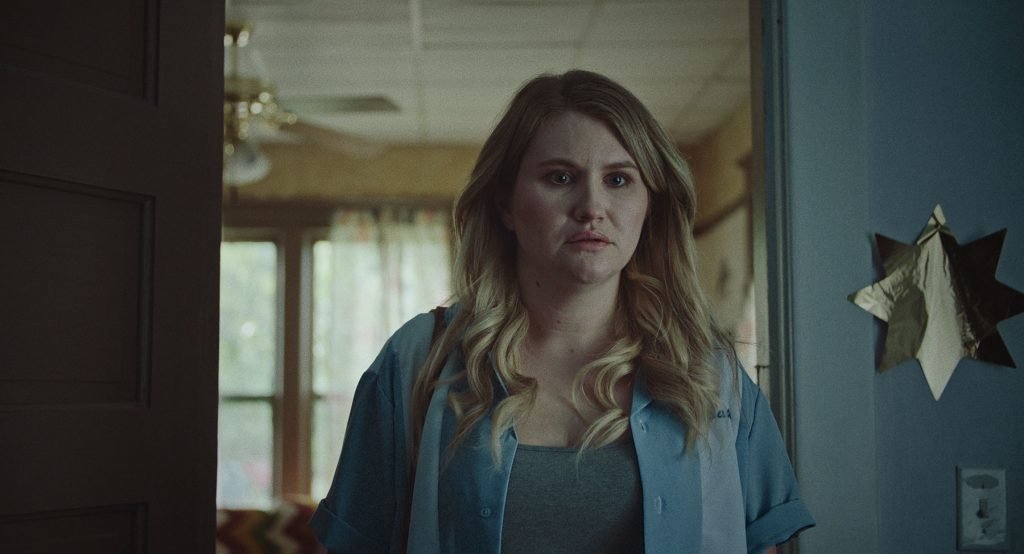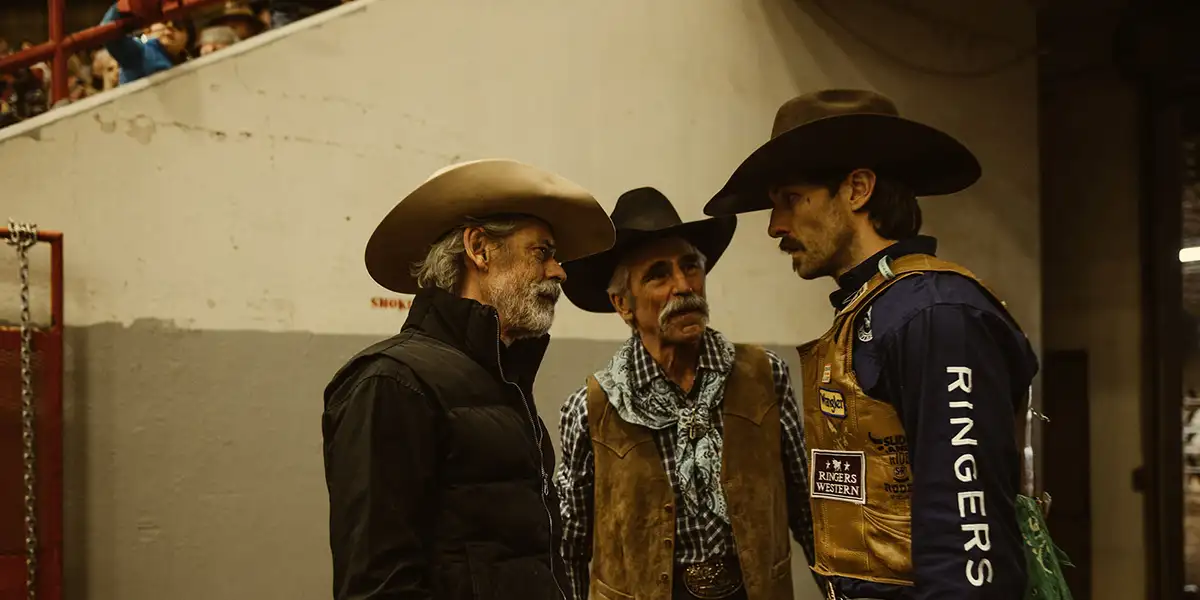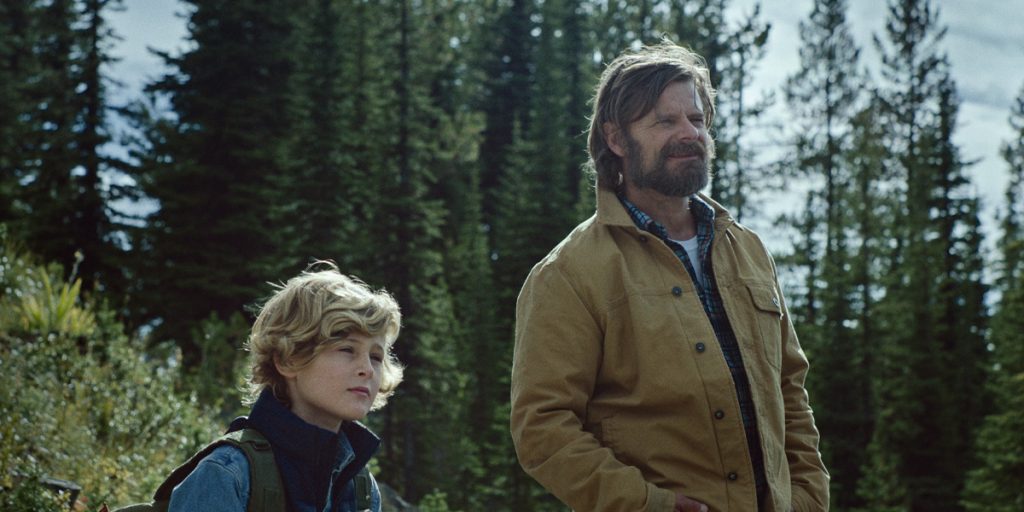Well-intentioned and heartfelt, Cowboys ultimately takes on too many genres and tones, which leaves it feeling slightly misdirected.
In the opening scene of Cowboys, Steve Zahn’s (Dallas Buyers Club, War for the Planet of the Apes) character, Troy, and his son, a trans boy Joe (Sasha Knight), look out at a jaw-dropping view of the Montana wilderness. Both marvel at its beauty, with Troy even going so far as to say the beauty is too much, such is its splendour. This tranquil moment shared between father and son captures the themes of acceptance and freewill that Cowboys so passionately advocates for. The message is struck from the outset, of how there is not just a hope but a need for society to better understand and acknowledge transgenderism and fight against discrimination. Troy and Joe are two people, both being who they truly are and in the arms of nature. Cowboys is a terrific commentary on these themes but simultaneously lets itself down by adding in other genres (crime thriller) and themes (mental health), which ultimately creates a still enjoyable but rather disarrayed affair that leaves you wanting more.
The story of Cowboys is told via Troy and Joe hiking through the wilderness, interspersed with a fair share of flashbacks. These fill in the plot piece by piece, showing how Joe’s recent transition to male as a 10-year-old was accepted by his father but not by his mother, Sally (Jillian Bell). The family dynamic in Cowboys is an interesting one and is given a great depth by Anna Kerrigan’s screenplay. The director/writer gives enough time to building these familial relationships both prior to and after Joe’s transition, allowing negative feelings to be seen before this happens which are then amplified when Joe tells his mother that he identifies as a male. Kerrigan also expertly builds the father-son relationship, their strong bond and love never in doubt. Troy’s swift and unwavering acceptance of Joe identifying as a male is also refreshing. They are a charming duo, amplified by the humorous screenplay, Zahn’s flamboyant father figure persona and Joe’s shy but sweet personality.
Sally’s unacceptance of Joe’s transgenderism is also carefully detailed, never simplistically villainising the mother but still forcefully acknowledging her thoughts and feelings towards the change are discriminatory and unacceptable. Ultimately, through the flashbacks in Cowboys, we learn that Troy has recently been released from prison and, on his return to the family home, discovers Joe is still being forced by his mother to identify as a female. Troy, seeing very little other choice, leaves with Joe in the middle of the night, thus beginning their trek through the mountains as well as a police search after them. One powerful moment of irony in Cowboys sees Sally, when asked for a recent picture of Joe, give only an old one from Joe’s childhood, when he had long hair. Precious time is lost in the hunt for Troy and his son, all boiling down to Sally’s stubborn, unsavoury views. There is a great resonance in these views, causing lost time in the police search.

There is a case to be made for Cowboys to have been restricted to being told only through the flashback scenes, without the present-day shots. As beautiful as these moments are, they also cause the story the most harm. The crime thriller, chase element is messy and never fully realised. Some odd moments jar with the otherwise intelligent drama. Ann Dowd (Compliance, Hereditary) as the lead police chief in the case brings an unwelcome melodrama to proceedings and is reflective of Cowboys as a whole being unsure of itself when it dips its toe in the crime thriller genre.
The revelation of Troy having bipolar disorder seems like a decision only there to further the plot, rather than being a smart look at mental illness. Granted, it is difficult to analyse this theme as a sidenote, but there is an air of laziness to it in Cowboys, even more so when Troy loses his medication which again, feels like a ploy just to add some drama. Zahn’s performance as the father is better in his quieter, more reserved moments. When he loses his medication and his mental health deteriorates, Zahn still maintains his strong emotional angle generally but occasionally lapses into melodrama. Cowboys ultimately suffers from these decisions, which is a shame considering the crux of the story is so powerful and intelligent. When it is at its most stripped back in the flashback scenes, the film is at its best.
The American West with all its grand rivers and sweeping forested mountains has perhaps never been better captured than in Brokeback Mountain (2005). In Ang Lee’s film, the landscape is not only beautiful but also a character, the titular mountain range being a place of escape where two men experience love away from discrimination. Cowboys has moments where the landscape is utilised effectively, like in the very opening scene, but eventually loses its connection to the setting as it becomes nothing more than something aesthetically pleasing. John Wakayama Carey’s cinematography is always picturesque but sometimes empty, which again can frustrate proceedings and potential seems to be wasted.
Whilst Cowboys might feel like a missed opportunity, there is still a great importance to its main theme of transgenderism. Knight, a trans boy in real life, being cast as a lead in a widely distributed film should be celebrated until it becomes part of the norm. Knight gives a subtle but touching performance, most notably in the scene where he reveals his true gender to his father, the pain and vulnerability from living a false life for 10 years rarely seen in youngsters on screen. Cowboys has its heart firmly in the right place and even if it suffers from attempting too much and thus feeling bloated, it is still an affirming, touching drama which is never not engaging.
Cowboys premiered online at BFI Flare in March, 2021 and will be available on Curzon Home Cinema and Digital Download from 7 May, 2021.

 loudandclearreviews.com
loudandclearreviews.com
